Connetti ai server DNS pubblici di AdGuard
Blocca rapidamente inserzioni, tracciatori, malware e siti web per adulti con l'aiuto dei server DNS pubblici AdGuard gratuiti
Opzione 1: Installa AdGuard Consigliato
Questo è il modo più veloce e semplice. Basta installare il blocca-inserzioni AdGuard sul tuo dispositivo, andare nelle impostazioni del server dell'app e selezionare AdGuard DNS. Non è necessario inserire manualmente gli indirizzi server DNS!
Oltre a DNS, otterrai un blocco delle inserzioni preciso e una protezione avanzata dal tracciamento
Proteggi il tuo dispositivo Windows a livello di sistema
Proteggi il tuo dispositivo macOS senza installare software aggiuntivo
Blocca inserzioni, tracciatori e minacce ovunque nel tuo dispositivo Android
Goditi un'esperienza senza inserzioni sul tuo dispositivo iOS — nei browser e nelle app
Opzione 2: Configura manualmente i DNS AdGuard
Se preferisci configurare manualmente il server pubblico DNS AdGuard, abbiamo tutto pronto per te. Seleziona la piattaforma del tuo dispositivo e ricevi le istruzioni per l'impostazione
Accedere a Impostazioni → Rete e Internet (o Wi-Fi e Internet)
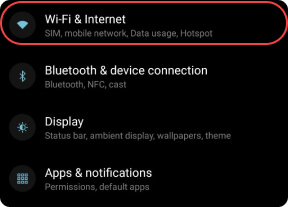
Selezionare Avanzate → DNS privato.
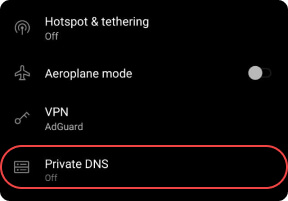
Selezionare Nome host provider DNS privato. Immettere uno dei server indicati di seguito:
Server predefinito
dns.adguard-dns.com
AdGuard DNS bloccherà annunci e tracker.
Server non filtrante
unfiltered.adguard-dns.com
AdGuard DNS non bloccherà annunci, tracker o altre richieste DNS.
Server di protezione della famiglia
family.adguard-dns.com
AdGuard DNS bloccherà annunci, tracker, contenuti per adulti e abiliterà la Ricerca sicura e la Modalità sicura, ove possibile.
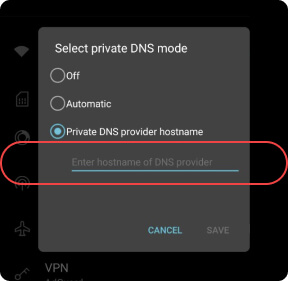
Toccare Salva.
Per ottenere un profilo di configurazione generico, seleziona un server DNS di seguito e tocca Scarica profilo di configurazione. Per ottenere un profilo di configurazione personalizzato, toccare Apri costruttore di profili.
Costruttore profili
Genera un profilo di configurazione per iOS/macOS che utilizzerà AdGuard DNS in modo nativo.
1. Seleziona un server DNS e un tipo di crittografia.
2. Disabilita AdGuard DNS per le reti Wi-Fi sottostanti.
3. Disattiva AdGuard DNS per i domini (e i relativi sottodomini) indicati di seguito.
Apri l'app Impostazioni sul tuo dispositivo.
Tocca Profilo scaricato.
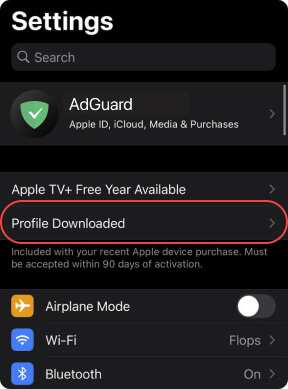
Tocca Installa e segui le istruzioni sullo schermo.
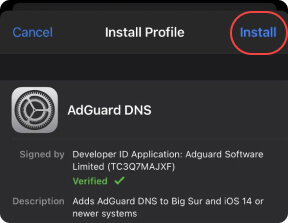
Accedere al menu Start → Pannello di controllo.
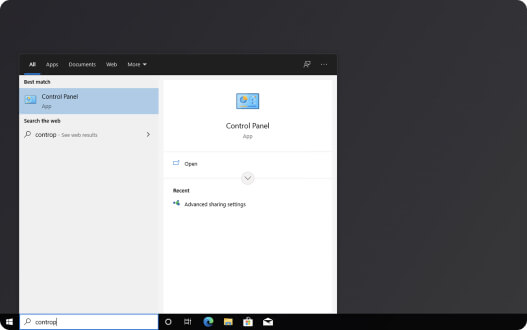
Selezionare Rete e Internet.
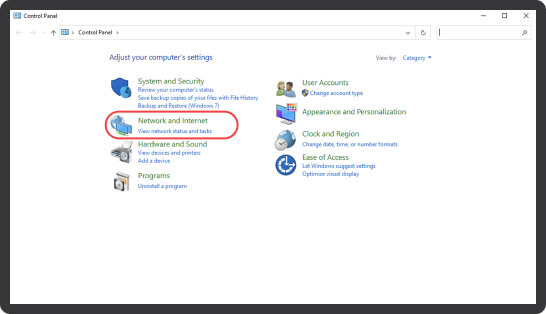
Fare clic su Centro connessioni di rete e condivisione.
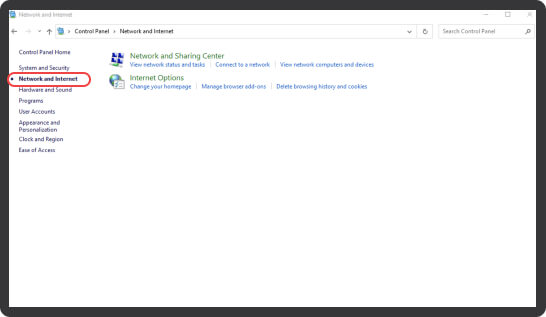
Nel pannello di sinistra, selezionate Modifica impostazioni adattatore.
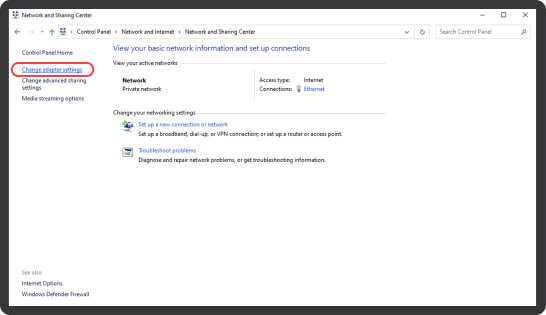
Fate clic sulla rete Wi-Fi a cui siete connessi.
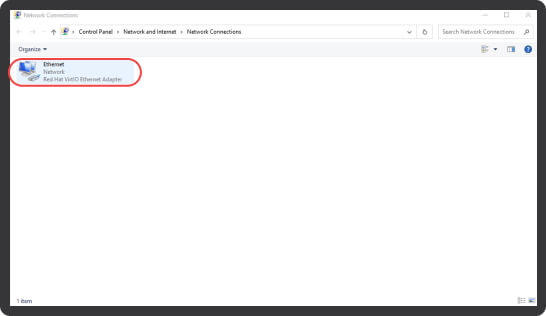
Nella barra delle opzioni, selezionare Cambia impostazioni di questa connessione. Se l'opzione è nascosta, fare clic sull'icona del gallone.
In alternativa, fare clic con il tasto destro del mouse sull'icona della connessione e selezionare Proprietà.
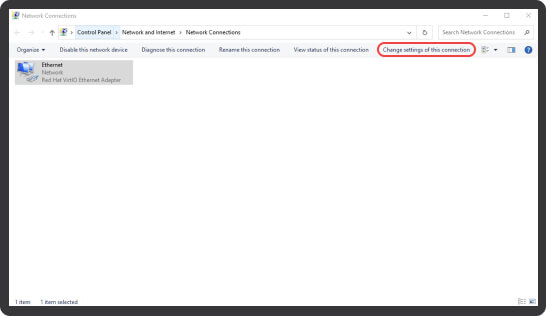
Selezionare Protocollo Internet versione 4 (TCP/IPv4).
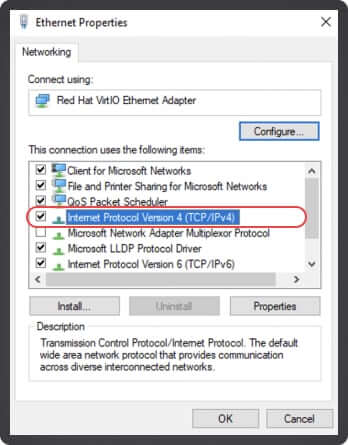
Fare clic su Proprietà.
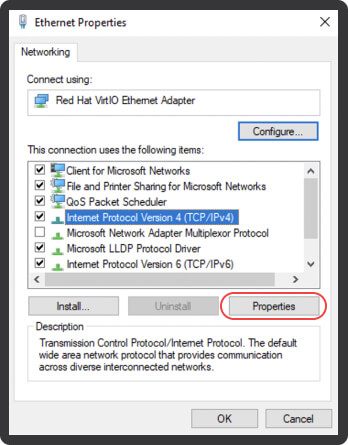
Selezionate Usa i seguenti indirizzi di server DNS.
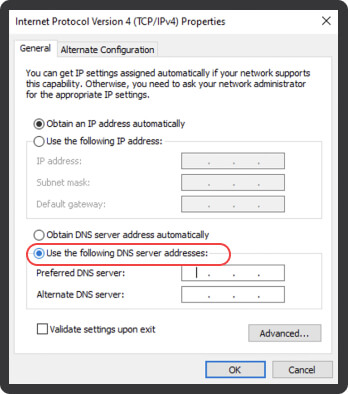
Immettere gli indirizzi di uno dei server seguenti come server DNS preferito e server DNS alternativo.
Server predefiniti
AdGuard DNS blocca pubblicità e tracker.
94.140.14.14
94.140.15.15
Server non filtranti
AdGuard DNS non bloccherà annunci, tracker o altre richieste DNS.
94.140.14.140
94.140.14.141
Server di protezione della famiglia
AdGuard DNS bloccherà gli annunci, i tracker, i contenuti per adulti e abiliterà la Ricerca sicura e la Modalità sicura, ove possibile.
94.140.14.15
94.140.15.16
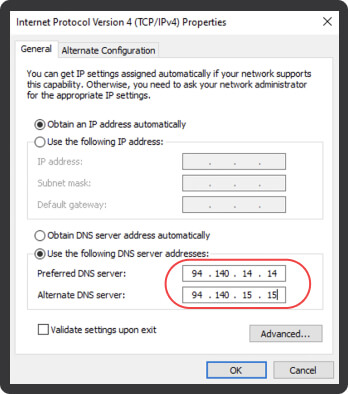
Fare clic su OK.
Selezionate Protocollo Internet versione 6 (TCP/IPv6) e fate clic su Proprietà.
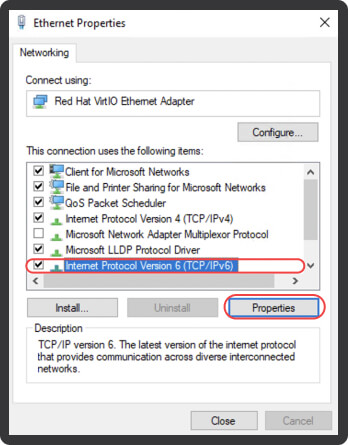
Selezionate Usa i seguenti indirizzi di server DNS.
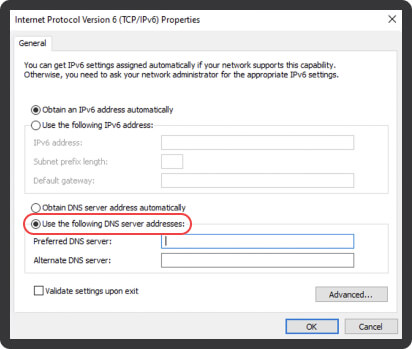
Immettere gli indirizzi di uno dei server seguenti come server DNS preferito e server DNS alternativo.
Server predefiniti
AdGuard DNS blocca pubblicità e tracker.
2a10:50c0::ad1:ff
2a10:50c0::ad2:ff
Server non filtranti
AdGuard DNS non bloccherà annunci, tracker o altre richieste DNS.
2a10:50c0::1:ff
2a10:50c0::2:ff
Server di protezione della famiglia
AdGuard DNS bloccherà gli annunci, i tracker, i contenuti per adulti e abiliterà la Ricerca sicura e la Modalità sicura, ove possibile.
2a10:50c0::bad1:ff
2a10:50c0::bad2:ff
Fare clic su OK.
Fare clic su Chiudi.
Per macOS Sequoia 15.5 o versioni successive
Scegli un server DNS in base alle tue preferenze e preme il pulsante per scaricare un profilo di configurazione.
Costruttore profili
Genera un profilo di configurazione per iOS/macOS che utilizzerà AdGuard DNS in modo nativo.
1. Seleziona un server DNS e un tipo di crittografia.
2. Disabilita AdGuard DNS per le reti Wi-Fi sottostanti.
3. Disattiva AdGuard DNS per i domini (e i relativi sottodomini) indicati di seguito.
Scegli Menu' Apple → Impostazioni di sistema.
Clicca Profilo Scaricato nella barra laterale e clicca due volte il profilo per installarlo.
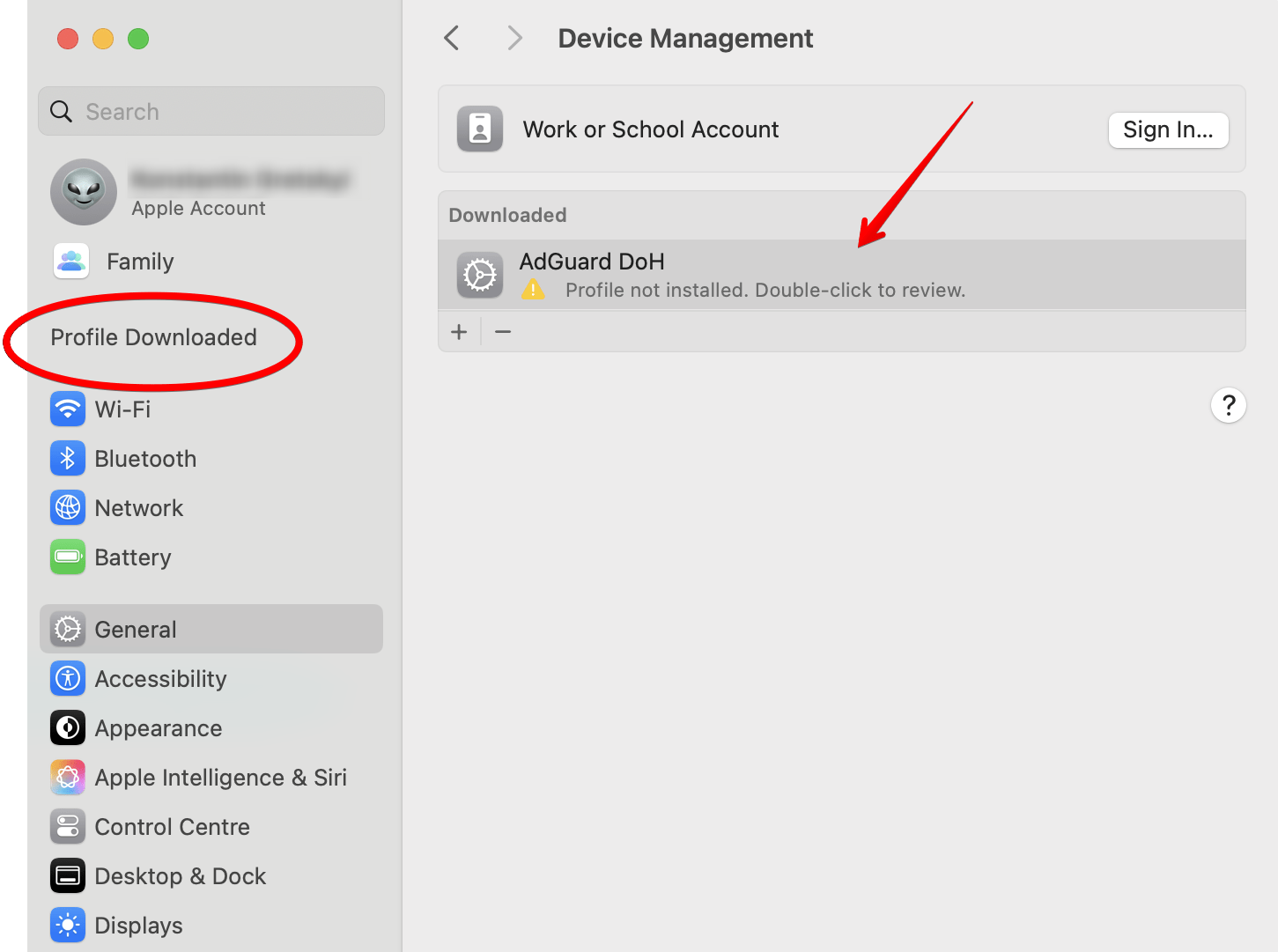
Inserisci la password di amministrazione e fai clic su OK.
Tutto fatto! Il tuo dispositivo è connesso correttamente a AdGuard DNS.
Per macOS Ventura e macOS Sequoia 15.4
Scegli un server DNS in base alle tue preferenze e preme il pulsante per scaricare un profilo di configurazione.
Costruttore profili
Genera un profilo di configurazione per iOS/macOS che utilizzerà AdGuard DNS in modo nativo.
1. Seleziona un server DNS e un tipo di crittografia.
2. Disabilita AdGuard DNS per le reti Wi-Fi sottostanti.
3. Disattiva AdGuard DNS per i domini (e i relativi sottodomini) indicati di seguito.
Scegli Menu' Apple → Impostazioni di sistema, clicca Riservatezza e sicurezza nella barra laterale, quindi clicca Profili a destra (potresti dover scorrere in basso).
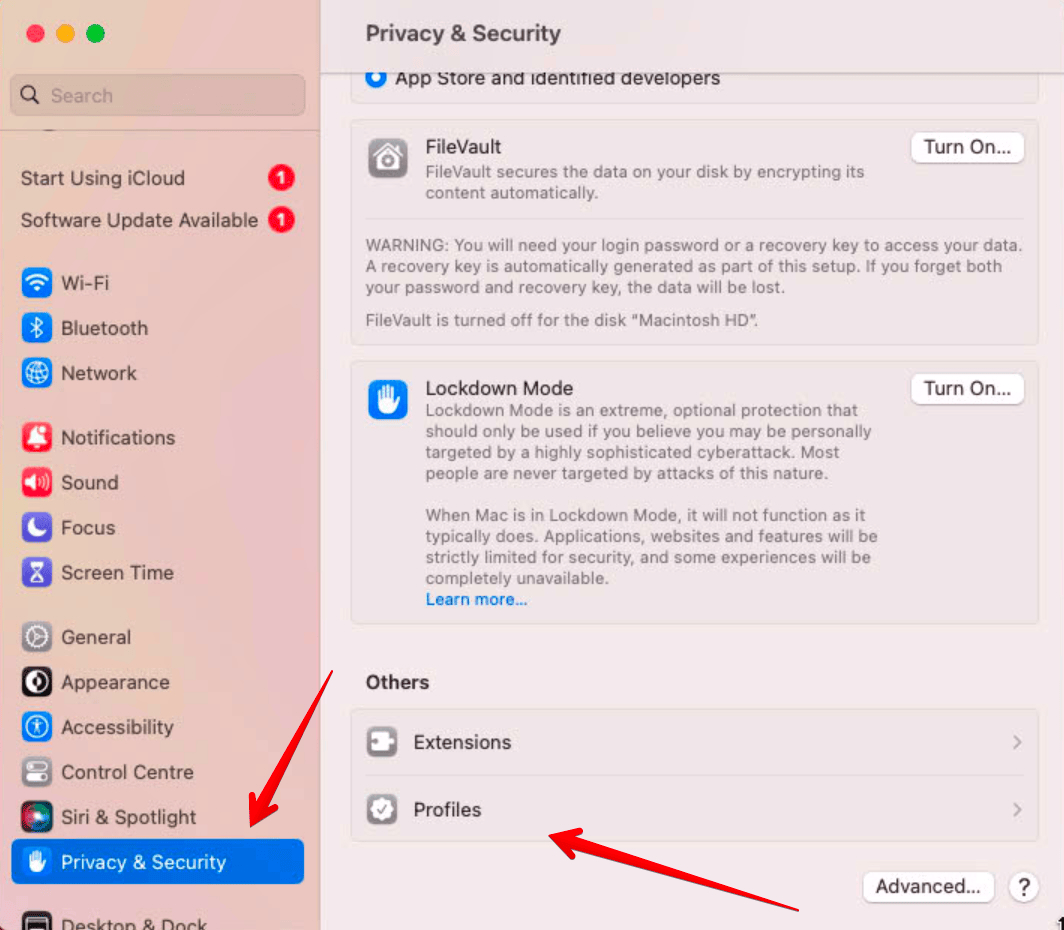
Nella sezione Scaricati, clicca due volte il profilo per installarlo.

Inserisci la password di amministrazione e fai clic su OK.
Tutto fatto! Il tuo dispositivo è connesso correttamente a AdGuard DNS.
Per macOS Big Sur e macOS Monterey
Scegli un server DNS in base alle tue preferenze e preme il pulsante per scaricare un profilo di configurazione.
Costruttore profili
Genera un profilo di configurazione per iOS/macOS che utilizzerà AdGuard DNS in modo nativo.
1. Seleziona un server DNS e un tipo di crittografia.
2. Disabilita AdGuard DNS per le reti Wi-Fi sottostanti.
3. Disattiva AdGuard DNS per i domini (e i relativi sottodomini) indicati di seguito.
Apri l'app Impostazioni sul tuo dispositivo.
Seleziona i profili.
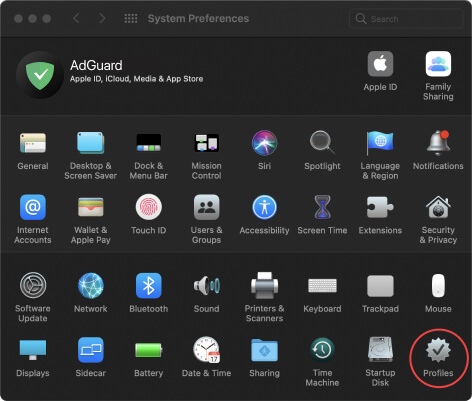
Seleziona il profilo AdGuard DNS scaricato e fai clic su Installa.
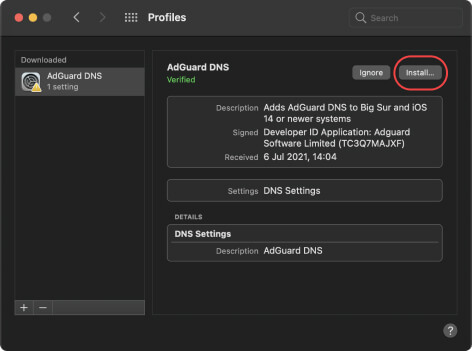
Tutto fatto! Il tuo dispositivo è connesso correttamente a AdGuard DNS.
AdGuard Home
Prova AdGuard Home, un potente strumento per bloccare annunci e tracker e gestire la propria rete domestica. Una volta installato e configurato, AdGuard Home protegge TUTTI i dispositivi connessi al Wi-Fi di casa senza richiedere alcun software client.
Per ulteriori informazioni, visiti il nostro repository GitHub.
Ubuntu
Aprire Impostazioni di sistema o Impostazioni di sistema, a seconda della versione.
Selezionate Wi-Fi per le connessioni wireless o Rete per le connessioni via cavo e fate clic sulla rotella dentata accanto alla connessione desiderata.
Selezionare IPv4.
Immettere gli indirizzi di uno dei server DNS indicati di seguito.
Server predefiniti
AdGuard DNS blocca pubblicità e tracker.
94.140.14.14
94.140.15.15
Server non filtranti
AdGuard DNS non bloccherà annunci, tracker o altre richieste DNS.
94.140.14.140
94.140.14.141
Server di protezione della famiglia
AdGuard DNS bloccherà gli annunci, i tracker, i contenuti per adulti e abiliterà la Ricerca sicura e la Modalità sicura, ove possibile.
94.140.14.15
94.140.15.16
Disattivare l'interruttore Automatico accanto al campo DNS.
Fare clic su Applica.
Selezionare IPv6.
Immettere gli indirizzi di uno dei server DNS indicati di seguito.
Server predefiniti
AdGuard DNS blocca pubblicità e tracker.
2a10:50c0::ad1:ff
2a10:50c0::ad2:ff
Server non filtranti
AdGuard DNS non bloccherà annunci, tracker o altre richieste DNS.
2a10:50c0::1:ff
2a10:50c0::2:ff
Server di protezione della famiglia
AdGuard DNS bloccherà gli annunci, i tracker, i contenuti per adulti e abiliterà la Ricerca sicura e la Modalità sicura, ove possibile.
2a10:50c0::bad1:ff
2a10:50c0::bad2:ff
Disattivare l'interruttore Automatico accanto al campo DNS.
Fare clic su Applica.
Riavviare la rete per applicare le modifiche.
Debian
Aprire il Terminale.
Nella riga di comando, digitare:
suInserire la password di root.
Nella riga di comando, digitare:
nano /etc/resolv.confQuando si apre l'editor di testo, digitare gli indirizzi di uno dei server indicati di seguito.
Server predefiniti
AdGuard DNS bloccherà annunci e tracker.
IPv4:
94.140.14.14
94.140.15.15
IPv6:
2a10:50c0::ad1:ff
2a10:50c0::ad2:ff
Server non filtranti
AdGuard DNS non bloccherà annunci, tracker o altre richieste DNS.
IPv4:
94.140.14.140
94.140.14.141
IPv6:
2a10:50c0::1:ff
2a10:50c0::2:ff
Server di protezione della famiglia
AdGuard DNS bloccherà gli annunci, i tracker, i contenuti per adulti e abiliterà la Ricerca sicura e la Modalità sicura, ove possibile.
IPv4:
94.140.14.15
94.140.15.16
IPv6:
2a10:50c0::bad1:ff
2a10:50c0::bad2:ff
Premere Ctrl+O per salvare il file.
Premere Invio.
Premere Ctrl+X per uscire dall'editor.
Nella riga di comando, inserire:
/etc/init.d/networking restartPremere Invio.
Chiudere il terminale.
Aprire le preferenze del router. Di solito è possibile accedervi tramite il browser. I modelli di router riportati di seguito indicano i possibili indirizzi.
Router Linksys e Asus: http://192.168.1.1
Router D-Link: http://192.168.0.1
Router Ubiquiti: http://unifi.ubnt.com
Inserire la password del router.
Nota: assicurarsi di registrare la password del router in un luogo sicuro. Alcuni modelli di router dispongono di applicazioni specifiche per la gestione delle password: se è il vostro caso, l'applicazione dovrebbe essere già installata sul vostro computer.
Andare alle impostazioni DNS nella pagina di amministrazione del router. Sostituite gli indirizzi DNS con gli indirizzi di uno dei server indicati di seguito.
Server predefiniti
AdGuard DNS bloccherà annunci e tracker.
IPv4:
94.140.14.14
94.140.15.15
IPv6:
2a10:50c0::ad1:ff
2a10:50c0::ad2:ff
Server non filtranti
AdGuard DNS non bloccherà annunci, tracker o altre richieste DNS.
IPv4:
94.140.14.140
94.140.14.141
IPv6:
2a10:50c0::1:ff
2a10:50c0::2:ff
Server di protezione della famiglia
AdGuard DNS bloccherà gli annunci, i tracker, i contenuti per adulti e abiliterà la Ricerca sicura e la Modalità sicura, ove possibile.
IPv4:
94.140.14.15
94.140.15.16
IPv6:
2a10:50c0::bad1:ff
2a10:50c0::bad2:ff
Salvare le modifiche.
PS4
Andare in Impostazioni → Rete.
Selezionare Imposta connessione Internet.
Scegliere Usa Wi-Fi o Usa cavo LAN a seconda della connessione di rete.
Selezionare Personalizzato.
Impostate Impostazioni indirizzo IP su Automatico.
Impostare Nome host DHCP su Non specificare.
Impostare le impostazioni DNS su Manuale.
Cambiare gli indirizzi DNS con gli indirizzi di uno dei server indicati di seguito.
Server predefiniti
AdGuard DNS bloccherà annunci e tracker.
94.140.14.14
94.140.15.15
Server non filtranti
AdGuard DNS non bloccherà annunci, tracker o altre richieste DNS.
94.140.14.140
94.140.14.141
Server di protezione della famiglia
AdGuard DNS bloccherà gli annunci, i tracker, i contenuti per adulti e abiliterà la Ricerca sicura e la Modalità sicura, ove possibile.
94.140.14.15
94.140.15.16
Se la vostra console di gioco supporta indirizzi IPv6, aggiungeteli anche voi.
Server predefiniti
AdGuard DNS blocca pubblicità e tracker.
2a10:50c0::ad1:ff
2a10:50c0::ad2:ff
Server non filtranti
AdGuard DNS non bloccherà annunci, tracker o altre richieste DNS.
2a10:50c0::1:ff
2a10:50c0::2:ff
Server di protezione della famiglia
AdGuard DNS bloccherà gli annunci, i tracker, i contenuti per adulti e abiliterà la Ricerca sicura e la Modalità sicura, ove possibile.
2a10:50c0::bad1:ff
2a10:50c0::bad2:ff
Impostare le impostazioni MTU su Automatico.
Impostare il server proxy su Non usare.
PS5
Accendere la console PS5 e accedere al proprio account.
Dalla schermata iniziale della PS5, selezionare l'icona Impostazioni (icona a forma di ingranaggio) situata nell'angolo in alto a destra dello schermo.
Nel menu Impostazioni, selezionare Rete.
In Rete, selezionare Impostazioni.
Scegliere la rete e selezionare Imposta connessione Internet.
Scegliere Personalizzato e selezionare Impostazioni DNS.
Selezionare Manuale e inserire l'indirizzo del server DNS primario:
Server predefiniti
AdGuard DNS bloccherà annunci e tracker.
94.140.14.14
94.140.15.15
Server non filtranti
AdGuard DNS non bloccherà annunci, tracker o altre richieste DNS.
94.140.14.140
94.140.14.141
Server di protezione della famiglia
AdGuard DNS bloccherà annunci, tracker e contenuti per adulti e abiliterà la Ricerca sicura e la Modalità sicura, ove possibile.
94.140.14.15
94.140.15.16
(Facoltativo) Inserire l'indirizzo del server DNS secondario. Si tratta di un server DNS di backup che la PS5 utilizzerà se il server DNS primario non è disponibile:
Server predefiniti
AdGuard DNS blocca pubblicità e tracker.
94.140.14.14
94.140.15.15
Server non filtranti
AdGuard DNS non bloccherà annunci, tracker o altre richieste DNS.
94.140.14.140
94.140.14.141
Server di protezione della famiglia
AdGuard DNS bloccherà annunci, tracker e contenuti per adulti e abiliterà la Ricerca sicura e la Modalità sicura, ove possibile.
94.140.14.15
94.140.15.16
Se la console supporta IPv6, aggiungere anche questi.
Server predefiniti
AdGuard DNS blocca pubblicità e tracker.
2a10:50c0::ad1:ff
2a10:50c0::ad2:ff
Server non filtranti
AdGuard DNS non bloccherà annunci, tracker o altre richieste DNS.
2a10:50c0::1:ff
2a10:50c0::2:ff
Server di protezione della famiglia
AdGuard DNS bloccherà annunci, tracker e contenuti per adulti e abiliterà la Ricerca sicura e la Modalità sicura, ove possibile.
2a10:50c0::bad1:ff
2a10:50c0::bad2:ff
Selezionare Avanti per continuare.
Nella schermata successiva, selezionare Automatico per le impostazioni MTU.
Nella schermata Server proxy, selezionare Non usare.
Selezionare Prova connessione Internet per verificare le nuove impostazioni DNS.
Una volta completato il test e visualizzato Connessione Internet: Successo, selezionare Conferma per salvare le impostazioni.
Riavviare la console PS5 per applicare le modifiche.
Xbox
Premere il pulsante Xbox sul controller per aprire la guida.
Selezionare Profilo e sistema → Impostazioni → Generale → Impostazioni di rete.
Dalle opzioni della schermata Rete, andare su Impostazioni avanzate → Impostazioni DNS.
Selezionare Manuale.
Modificare gli indirizzi DNS con gli indirizzi di uno dei server indicati di seguito.
Server predefiniti
AdGuard DNS bloccherà annunci e tracker.
94.140.14.14
94.140.15.15
Server non filtranti
AdGuard DNS non bloccherà annunci, tracker o altre richieste DNS.
94.140.14.140
94.140.14.141
Server di protezione della famiglia
AdGuard DNS bloccherà gli annunci, i tracker, i contenuti per adulti e abiliterà la Ricerca sicura e la Modalità sicura, ove possibile.
94.140.14.15
94.140.15.16
Se la vostra console di gioco supporta indirizzi IPv6, aggiungeteli anche voi.
Server predefiniti
AdGuard DNS blocca pubblicità e tracker.
2a10:50c0::ad1:ff
2a10:50c0::ad2:ff
Server non filtranti
AdGuard DNS non bloccherà annunci, tracker o altre richieste DNS.
2a10:50c0::1:ff
2a10:50c0::2:ff
Server di protezione della famiglia
AdGuard DNS bloccherà gli annunci, i tracker, i contenuti per adulti e abiliterà la Ricerca sicura e la Modalità sicura, ove possibile.
2a10:50c0::bad1:ff
2a10:50c0::bad2:ff
Premere B per confermare le modifiche e uscire dal menu.
Nintendo 3DS
Si applica a: New Nintendo 3DS, New Nintendo 3DS XL, New Nintendo 2DS XL, Nintendo 3DS, Nintendo 3DS XL e Nintendo 2DS.
Dal menu Home, seleziona Impostazioni di sistema.
Vai su Impostazioni Internet → Impostazioni di connessione.
Seleziona il file di connessione, quindi seleziona Modifica impostazioni.
Seleziona DNS, quindi seleziona Configura.
Imposta Ottieni automaticamente DNS su No.
Seleziona Configurazione dettagliata, quindi DNS primario. Tieni premuta la freccia sinistra per eliminare il DNS esistente.
Inserisci l'indirizzo di uno dei server qui sotto. Selezionare OK per tornare alla schermata DNS. Allo stesso modo, inserisci il DNS secondario.
Server predefiniti
AdGuard DNS bloccherà annunci e tracker.
94.140.14.14
94.140.15.15
Server senza filtro
AdGuard Il DNS non bloccherà annunci, tracker o qualsiasi altra richiesta DNS.
94.140.14.140
94.140.14.141
Server di protezione della famiglia
AdGuard DNS bloccherà annunci, tracker, contenuti per adulti e abiliterà la Ricerca sicura e la Modalità sicura, ove possibile.
94.140.14.15
94.140.15.16
Premi Salva, quindi OK.
Nintendo Switch
Accendi la tua console Nintendo Switch e vai al menu Home.
Vai su Impostazioni di sistema → Internet.
Seleziona la rete Wi-Fi per la quale desideri modificare le impostazioni DNS.
Fai clic su Modifica impostazioni per la rete Wi-Fi selezionata.
Scorri verso il basso e seleziona Impostazioni DNS.
Seleziona Manuale e inserisci l'indirizzo del server DNS primario.
Server predefiniti
AdGuard DNS bloccherà annunci e tracker.
94.140.14.14
94.140.15.15
Server senza filtro
AdGuard Il DNS non bloccherà annunci, tracker o qualsiasi altra richiesta DNS.
94.140.14.140
94.140.14.141
Server di protezione della famiglia
AdGuard DNS bloccherà annunci, tracker e contenuti per adulti e abiliterà la Ricerca sicura e la Modalità sicura, ove possibile.
94.140.14.15
94.140.15.16
(Facoltativo) Immettere l'indirizzo del server DNS secondario. Questo è un server DNS di backup che il tuo Nintendo Switch utilizzerà se il server DNS primario non è disponibile.
Server predefiniti
AdGuard DNS bloccherà annunci e tracker.
94.140.14.14
94.140.15.15
Server senza filtro
AdGuard Il DNS non bloccherà annunci, tracker o qualsiasi altra richiesta DNS.
94.140.14.140
94.140.14.141
Server di protezione della famiglia
AdGuard DNS bloccherà annunci, tracker e contenuti per adulti e abiliterà la Ricerca sicura e la Modalità sicura, ove possibile.
94.140.14.15
94.140.15.16
Seleziona Salva per salvare le impostazioni DNS.
Riconnettiti alla rete Wi-Fi per applicare le modifiche.
Steam Deck
Aprire le impostazioni di Steam Deck facendo clic sull'icona dell'ingranaggio nell'angolo superiore destro dello schermo.
Fare clic su Rete.
Fare clic sull'icona dell'ingranaggio accanto alla connessione di rete che si desidera configurare.
Selezionare IPv4 o IPv6, a seconda del tipo di rete utilizzata.
Selezionare Solo indirizzi automatici (DHCP) o Automatico (DHCP).
Nel campo Server DNS, inserire uno dei seguenti indirizzi IP.
Server predefiniti
AdGuard DNS bloccherà annunci e tracker.
94.140.14.14
94.140.15.15
Server non filtranti
AdGuard DNS non bloccherà annunci, tracker o altre richieste DNS.
94.140.14.140
94.140.14.141
Server di protezione della famiglia
AdGuard DNS bloccherà annunci, tracker e contenuti per adulti e abiliterà la Ricerca sicura e la Modalità sicura, ove possibile.
94.140.14.15
94.140.15.16
Se la console supporta IPv6, aggiungere anche questi.
Server predefiniti
AdGuard DNS blocca pubblicità e tracker.
2a10:50c0::ad1:ff
2a10:50c0::ad2:ff
Server non filtranti
AdGuard DNS non bloccherà annunci, tracker o altre richieste DNS.
2a10:50c0::1:ff
2a10:50c0::2:ff
Server di protezione della famiglia
AdGuard DNS bloccherà annunci, tracker e contenuti per adulti e abiliterà la Ricerca sicura e la Modalità sicura, ove possibile.
2a10:50c0::bad1:ff
2a10:50c0::bad2:ff
Salvare le modifiche.
Samsung Smart TV
Aprire Impostazioni → Rete.
Selezionare Stato rete → Impostazioni IP.
Fare clic su Impostazione DNS, quindi selezionare Inserisci manualmente dal menu a discesa.
Nel campo Server DNS, inserire uno dei seguenti indirizzi di server DNS.
Server predefiniti
AdGuard DNS bloccherà annunci e tracker.
94.140.14.14
94.140.15.15
Server non filtranti
AdGuard DNS non bloccherà annunci, tracker o altre richieste DNS.
94.140.14.140
94.140.14.141
Server di protezione della famiglia
AdGuard DNS bloccherà annunci, tracker e contenuti per adulti e abiliterà la Ricerca sicura e la Modalità sicura, ove possibile.
94.140.14.15
94.140.15.16
Salvare le modifiche e riavviare il televisore Samsung.
LG
Apri Impostazioni → tutte le impostazioni.
Fare clic su Rete e selezionare la rete Wi-Fi.
Apri Impostazioni Wi-Fi avanzate e fai clic su Modifica.
Deseleziona Imposta automaticamente.
Nel campo Server DNS, immettere uno dei seguenti indirizzi server DNS.
Server predefiniti
AdGuard DNS bloccherà annunci e tracker.
94.140.14.14
94.140.15.15
Server non filtranti
AdGuard DNS non bloccherà annunci, tracker o altre richieste DNS.
94.140.14.140
94.140.14.141
Server di protezione della famiglia
AdGuard DNS bloccherà annunci, tracker e contenuti per adulti e abiliterà la ricerca sicura e la modalità provvisoria, ove possibile.
94.140.14.15
94.140.15.16
Fare clic su Connetti per salvare le modifiche.
Android TV
Apri Impostazioni → Rete e Internet.
Seleziona la tua rete Wi-Fi o connessione cablata.
Annota l'indirizzo IP del tuo dispositivo. Puoi trovarlo sotto l'indirizzo IP.
Scorri verso il basso fino a Impostazioni IP e seleziona Statico.
Inserisci l'indirizzo IP del tuo dispositivo.
Per Gateway, inserisci l'indirizzo IP del tuo router. Di solito puoi trovarlo nelle impostazioni del tuo router o contattando il tuo provider di servizi Internet.
Per Network prefix length, inserisci:
24Per DNS 1, inserisci l'indirizzo del server DNS primario.
Server predefiniti
AdGuard DNS bloccherà annunci e tracker.
94.140.14.14
94.140.15.15
Server non filtranti
AdGuard DNS non bloccherà pubblicità, tracker o qualsiasi altra richiesta DNS.
94.140.14.140
94.140.14.141
Server di protezione per la famiglia
AdGuard DNS bloccherà pubblicità, tracker e contenuti per adulti e abiliterà Safe Search e Safe Mode, ove possibile.
94.140.14.15
94.140.15.16
Per DNS 2, inserisci l'indirizzo del server DNS secondario. Questo è un server DNS di backup che il tuo box Android TV utilizzerà se il server DNS primario non è disponibile.
Server predefiniti
AdGuard DNS bloccherà annunci e tracker.
94.140.14.14
94.140.15.15
Server non filtranti
AdGuard DNS non bloccherà pubblicità, tracker o qualsiasi altra richiesta DNS.
94.140.14.140
94.140.14.141
Server di protezione della famiglia
AdGuard DNS bloccherà annunci, tracker e contenuti per adulti e abiliterà SafeSearch e Safe Mode, ove possibile.
94.140.14.15
94.140.15.16
Salva le modifiche.
Apple TV
Aprire Impostazioni → Rete.
Selezionare la rete Wi-Fi o la connessione via cavo.
Fare clic su Configura DNS e scegliere Manuale.
Inserire uno dei seguenti indirizzi di server DNS.
Server predefiniti
AdGuard DNS blocca pubblicità e tracker.
94.140.14.14
94.140.15.15
Server non filtranti
AdGuard DNS non bloccherà annunci, tracker o altre richieste DNS.
94.140.14.140
94.140.14.141
Server di protezione della famiglia
AdGuard DNS bloccherà annunci, tracker e contenuti per adulti e abiliterà la Ricerca sicura e la Modalità sicura, ove possibile.
94.140.14.15
94.140.15.16
Fare clic su Fine.
Fire TV
Apri Impostazioni → My Fire TV → Informazioni → Rete.
Annotare l'indirizzo IP, il gateway e la subnet mask.
Torna a Impostazioni e fai clic su Rete.
Selezionare la rete e fare clic sul pulsante del menu del telecomando (☰) per dimenticarsene.
Selezionare nuovamente la rete e inserire la password. Invece di fare clic su Connetti, fai clic su Avanzate.
Immettere l'indirizzo IP e il gateway annotati.
Per Subnet Mask, se la tua subnet mask è 255.255.255.0, inserisci:
24 se la tua subnet mask è 255.255.255.255: 32Per DNS 1, inserisci l'indirizzo del server DNS primario.
Server predefiniti
AdGuard DNS bloccherà annunci e tracker.
94.140.14.14
94.140.15.15
Server non filtranti
AdGuard DNS non bloccherà pubblicità, tracker o qualsiasi altra richiesta DNS.
94.140.14.140
94.140.14.141
Server di protezione per la famiglia
AdGuard DNS bloccherà pubblicità, tracker e contenuti per adulti e abiliterà Safe Search e Safe Mode, ove possibile.
94.140.14.15
94.140.15.16
Per DNS 2, inserisci l'indirizzo del server DNS secondario. Questo è un server DNS di backup che la tua Fire TV utilizzerà se il server DNS primario non è disponibile.
Server predefiniti
AdGuard DNS bloccherà annunci e tracker.
94.140.14.14
94.140.15.15
Server non filtranti
AdGuard DNS non bloccherà pubblicità, tracker o qualsiasi altra richiesta DNS.
94.140.14.140
94.140.14.141
Server di protezione della famiglia
AdGuard DNS bloccherà annunci, tracker e contenuti per adulti e abiliterà SafeSearch e Safe Mode, ove possibile.
94.140.14.15
94.140.15.16
Salva le modifiche.
Indirizzi dei nostri server
Se già sai come impostare il DNS sul tuo dispositivo, usa questi indirizzi
DNS-over-HTTPS
Server predefinito
AdGuard DNS bloccherà annunci e tracker.
Server non filtrante
AdGuard DNS non blocca annunci, tracker o altre richieste DNS.
Server di protezione della famiglia
AdGuard DNS bloccherà annunci, tracker, contenuti per adulti e abiliterà la Ricerca sicura e la Modalità sicura, ove possibile.
DNS-over-TLS
Server predefinito
AdGuard DNS bloccherà annunci e tracker.
tls://dns.adguard-dns.com
Server non filtrante
AdGuard DNS non blocca annunci, tracker o altre richieste DNS.
tls://unfiltered.adguard-dns.com
Server di protezione della famiglia
AdGuard DNS bloccherà annunci, tracker, contenuti per adulti e abiliterà la Ricerca sicura e la Modalità sicura, ove possibile.
tls://family.adguard-dns.com
DNS-over-QUIC
Server predefinito
AdGuard DNS bloccherà annunci e tracker.
quic://dns.adguard-dns.com
Server non filtrante
AdGuard DNS non blocca annunci, tracker o altre richieste DNS.
quic://unfiltered.adguard-dns.com
Server di protezione della famiglia
AdGuard DNS bloccherà annunci, tracker, contenuti per adulti e abiliterà la Ricerca sicura e la Modalità sicura, ove possibile.
quic://family.adguard-dns.com
DNSCrypt
Server predefinito
AdGuard DNS bloccherà annunci e tracker.
sdns://AQMAAAAAAAAAETk0LjE0MC4xNC4xNDo1NDQzINErR_JS3PLCu_iZEIbq95zkSV2LFsigxDIuUso_OQhzIjIuZG5zY3J5cHQuZGVmYXVsdC5uczEuYWRndWFyZC5jb20
Server non filtrante
AdGuard DNS non blocca annunci, tracker o altre richieste DNS.
sdns://AQMAAAAAAAAAEjk0LjE0MC4xNC4xNDA6NTQ0MyC16ETWuDo-PhJo62gfvqcN48X6aNvWiBQdvy7AZrLa-iUyLmRuc2NyeXB0LnVuZmlsdGVyZWQubnMxLmFkZ3VhcmQuY29t
Server di protezione della famiglia
AdGuard DNS bloccherà annunci, tracker, contenuti per adulti e abiliterà la Ricerca sicura e la Modalità sicura, ove possibile.
sdns://AQMAAAAAAAAAETk0LjE0MC4xNC4xNTo1NDQzILgxXdexS27jIKRw3C7Wsao5jMnlhvhdRUXWuMm1AFq6ITIuZG5zY3J5cHQuZmFtaWx5Lm5zMS5hZGd1YXJkLmNvbQ
DNS semplice
Server predefiniti
AdGuard DNS blocca annunci e tracker.
IPv4:
94.140.14.14
94.140.15.15
IPv6:
2a10:50c0::ad1:ff
2a10:50c0::ad2:ff
Server non filtranti
AdGuard DNS non bloccherà annunci, tracker o altre richieste DNS.
IPv4:
94.140.14.140
94.140.14.141
IPv6:
2a10:50c0::1:ff
2a10:50c0::2:ff
Server di protezione della famiglia
AdGuard DNS bloccherà gli annunci, i tracker, i contenuti per adulti e abiliterà la Ricerca sicura e la Modalità sicura, ove possibile.
IPv4:
94.140.14.15
94.140.15.16
IPv6:
2a10:50c0::bad1:ff
2a10:50c0::bad2:ff
Prova il DNS privato AdGuard
Un DNS pubblico di fiducia è ottimo, ma hai poco controllo su di esso e non puoi vedere cosa sta bloccando e dove. Il DNS privato è un modo per avere il proprio firewall a livello di rete e godere di un controllo completo su tutti i tuoi dispositivi
Testo copiato